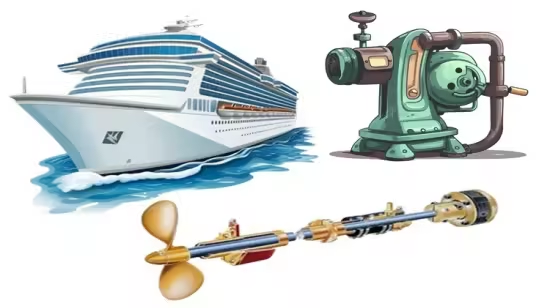
Marine Engineering Fundamentals: A Complete Beginner's Guide
Published 6/2025
MP4 | Video: h264, 1280x720 | Audio: AAC, 44.1 KHz, 2 Ch
Language: English | Duration: 44m | Size: 435 MB
A beginner's guide to ship systems, marine engines, auxiliary machinery, and onboard safety essentials.
What you'll learn
Understand the basic principles of marine engineering, including ship classification, propulsion systems, and engine types.
Identify the key components and functions of marine diesel engines, auxiliary machinery, and power transmission systems.
Explain the operation and purpose of onboard systems such as boilers, steering gears, oily water separators, and refrigeration cycles.
Apply foundational knowledge to recognize the importance of safety, international regulations, and environmental protection in marine engineering.
Requirements
No prior experience in marine engineering is required - this course is designed for complete beginners. A basic understanding of high school-level science (physics and mathematics) will be helpful. Ability to read and understand technical English (diagrams, labels, and terminology). A stable internet connection to stream video lectures and download PDF materials. Curiosity and interest in ships, engines, and how marine systems work.
Description
This course provides a comprehensive introduction to the fundamental principles of marine engineering, tailored specifically for beginners who are interested in exploring the maritime industry. It covers a wide range of essential topics that form the backbone of marine engineering, including ship propulsion systems, the operation and mechanics of marine engines, basic ship maintenance, and vital safety protocols on board vessels. Students will learn how different types of engines work to propel ships through the water, the function of auxiliary systems, and the importance of routine maintenance to ensure safe and efficient vessel operation.The course combines clear theoretical explanations with practical examples and real-world scenarios, making it easier for learners to understand complex concepts and apply their knowledge effectively. Emphasis is placed on safety procedures and environmental regulations that every marine engineer must be familiar with to protect both crew and marine ecosystems.By the end of this course, learners will have gained a solid foundation in marine engineering principles, preparing them for more advanced studies or entry-level roles within the maritime sector. Whether you aim to become a marine engineer, technician, or simply wish to broaden your understanding of how ships operate, this course offers the essential knowledge and skills to get started on your maritime career journey.
Who this course is for
Aspiring marine engineers and students considering a career in the maritime or offshore industries Nautical science or deck cadets who want to understand the engineering side of ship operations Engineering students or recent graduates seeking an introduction to marine systems and propulsion Technical professionals or enthusiasts interested in how ships work and how onboard systems are designed and maintained Anyone curious about marine diesel engines, propulsion, safety systems, and maritime technology - no prior experience required
Code:
Bitte
Anmelden
oder
Registrieren
um Code Inhalt zu sehen!